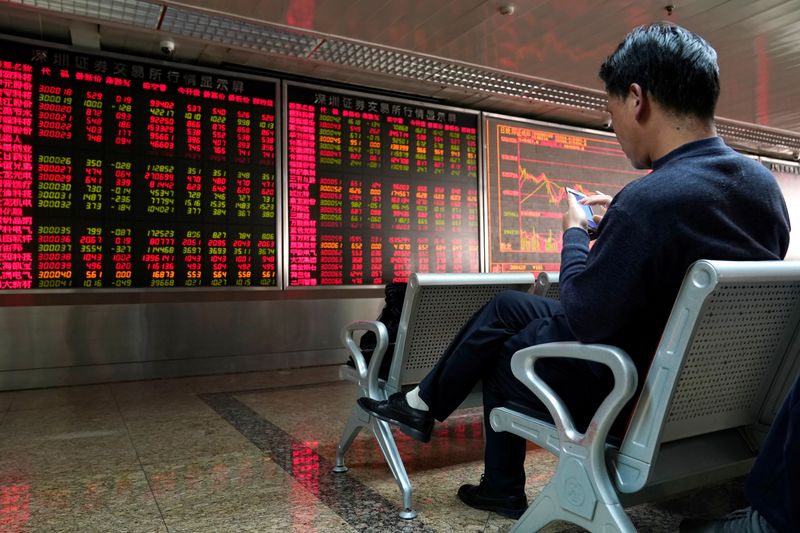By Swati Pandey
SYDNEY (Reuters) - A gauge of Asian shares fell for a third straight session on Friday as jitters over next week's U.S. presidential election and a shaky global economic outlook enveloped markets.
E-Mini futures for S&P500 (ESc1) skidded 1.5%, a signal Wall Street would open in the red later in the day.
In early European trade, the pan-region Euro Stoxx 50 futures (STXEc1) were down 0.4%, German DAX futures (FDXc1) slipped 0.3% while London's FTSE futures (FFIc1) were a shade weaker.
MSCI's broadest index of Asia-Pacific shares outside of Japan (MIAPJ0000PUS) was last down 0.1%, on track to the end the week 1.1% lower after four straight weeks of gains.
Still, the index has risen 3.8% in October so far, and analysts expect this broader outperformance to extend further.
"For a crisis of this scale, Asian equities have performed remarkably well," Citi analysts wrote in a note.
"Within the region, markets with a higher weighting of technology stocks or where the recovery has become more entrenched have outperformed," they added.
"This solid performance can continue, in our view. Valuations are reasonable for an early stage of a recovery while liquidity is generous. There has also been a perceptible drop in volatility in recent months."
The mood on Friday was less positive, though.
Australia's ASX 200 (AXJO) fell 0.5% and New Zealand's benchmark index faltered nearly 1%. Japan's Nikkei (N225) slipped 0.85% and was set for its biggest weekly loss in more than two months.
Chinese shares, which had started marginally higher, eased too with the blue-chip index (CSI300) off 0.1%.
Record numbers of coronavirus cases worldwide and the Nov. 3 U.S. presidential election remained the major focus for investors. On Wednesday, global coronavirus cases rose by over 500,000 for the first time, with France and Germany prepping fresh lockdowns.
The falls in Asia occurred despite a solid session on Wall Street overnight, which was helped by a diet of strong quarterly reports from tech giants and data showing the U.S. economy grew at a record annualised pace of 33.1% in the third quarter.
"Even with the rebound, U.S. output remains 3.5% below its pre-COVID levels. The path towards recovery is much less clear from here, especially as the number of virus cases grows and there are near-term impediments to a fiscal deal," wrote ANZ analysts in a note.
The European Central Bank committed to further action in December to further lend economic support as European nations grappled with a renewed coronavirus outbreak.
Analysts expect an expansion and extension of the ECB's Pandemic Emergency Purchase Programme, a lower deposit facility rate, and even more generous lending terms for banks in December.
The announcement sent the euro (EUR=) sliding to a four-week low of $0.1648 to be last at $1.1679.
The dollar was weaker against the Japanese yen
In commodities, oil picked up after hitting a five-month low on Thursday, with Brent crude futures (LCOc1) up 15 cents at $37.80 a barrel and U.S. crude (CLc1) adding 5 cents at $36.22.

Gold rose, with spot prices climbing 0.4% to $1,874.06 an ounce.